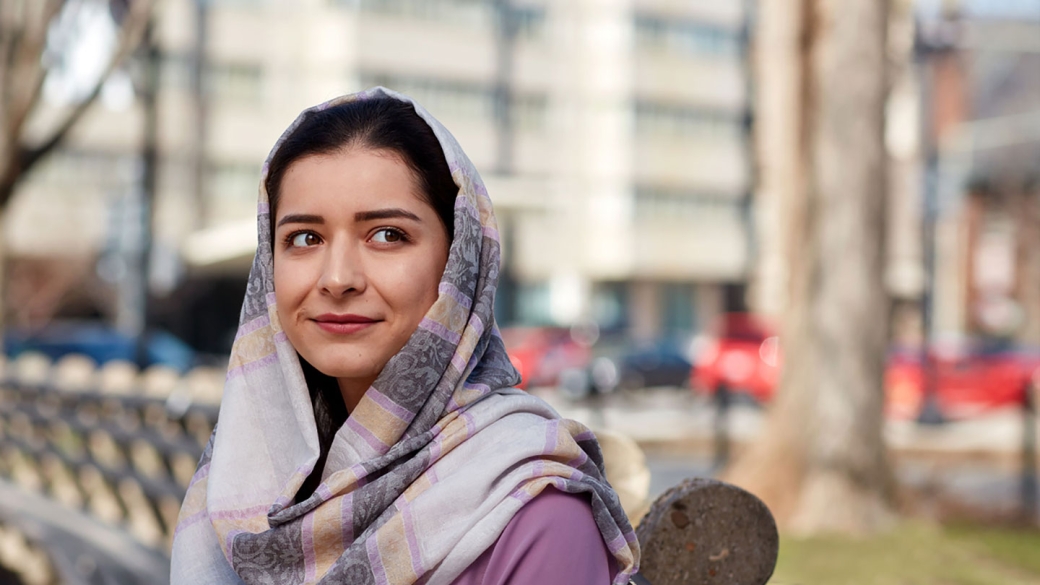Onaba Payab: Leading from the Front

A self-described “reserved Afghan,” Onaba Payab MAIPD ’18 is modest about her many achievements. Most of her classmates will not know that she is the first female valedictorian at the American University of Afghanistan in Kabul; that before coming to Monterey as a Fulbright Scholar she moderated a discussion between former First Lady Laura Bush and then First Lady Michelle Obama; that she is considered to be one of Afghanistan’s future leaders and was recently part of a delegation of Afghan women at the U.S. Capitol. Here, she shares some of her insights with us.
Focus on the positive. I was only a few months old when our family fled the civil war and settled as refugees in Pakistan. But Afghans pride themselves on resilience, and it is this resilience that often remedies the trauma that has ravaged our country. Like so many Afghan refugees, my family instilled in me a strong work ethic, a positive outlook, and optimism that constantly reminded me that besides the difficulties, there were opportunities available for Afghan refugees in Pakistan. While Pakistan was never home, living there for 16 years meant my siblings and I had access to a pretty good education system.
Change happens slowly, especially in nations with centuries of history. Sixteen years ago, no girls in Afghanistan went to school, and the only education available to boys was religious. Now, 3.6 million girls are being educated, and women are taking roles in the government in greater numbers. It is barely believable just how far we have come as a country. We still have much to do of course, but inclusivity is seeing great progress and is perhaps the single greatest defining feature and leap since 2001. To sustain these gains and build on them further, the continued moral and financial support of the international community is vital.
Afghanistan is still a fragile country. Gains can be undone. What gives me hope is the younger generation. We have a very young population: 50 percent of Afghans are under the age of 18. When I had the opportunity to speak with members of the U.S. Congress as part of the U.S.-Afghan Women’s Council, I encouraged them to focus on education. Young people want a purpose in life. It is important to invest in them. Only if we can ensure that opportunities are available for each and every young woman and man to realize her or his full potential can we hope to realize the potential of the country as a whole. The willingness of these young Afghans to see a peaceful and stable country will definitely lead to peace and prosperity.
You have to engage men to change things for women. I am very lucky to have a supportive family. My father has always supported my education, and all of my siblings are well educated. In the context of a society like Afghanistan, we must have the support of men. They have a critical role to play when it comes to inclusion and eliminating gender bias. Women who are breaking new territories need strong networks that will help them be successful.
I always say, if I will not bring about change, then who? Things are changing. There is respect for educated people in Afghanistan, especially among the younger generation. I have learned a lot here and believe I have a lot to share when I return home this summer. Already I know I am a role model for young girls, and I intend to show them that there are many options for them in the future if they stay in school and believe in themselves. I want to show that Afghan women are equal to Afghan men in humanity, dignity, and ability, and that they are able to play an equal role in rebuilding Afghanistan. I believe the best way to bring “change” is to lead from the front, and to lead by example. I know that it is not going to be an easy task to achieve my goals, but as Rahman Baba, one of the greatest poets of Afghanistan, says, “If you dive you will definitely acquire it, who says there is no pearl in the sea.”
Self-confidence is key. Before going on stage with Mrs. Bush and Mrs. Obama, I was stressed. I was actually stressed from the moment this opportunity to go to Dallas and moderate their discussion was offered to me. But once there, I reminded myself of my abilities and strengths. I kept telling myself, “You can do it.” After it was over, I realized that I can totally do this sort of thing and that positive thinking is key to self-confidence.
I have learned that looking people in the eye, smiling, and talking to them is really rewarding. In Afghan culture a woman looks down and does not smile much, which really makes you scared of people. I was warned against smiling too much or talking to people I didn’t know. But as I started meeting people from diverse backgrounds in the U.S., I realized that it is good to be social and have a network of people.
Friends make life better. All my life I have lived with extended family, and when I moved to Monterey my parents were concerned about the living situation. I was homesick for a year, but the only time I was not homesick was actually last semester when I had my roommate, Kate Fisher MBA/MAIPS ’18. She respected my culture and I respected her culture, and we supported each other. When I hosted my farewell party before going to Washington, D.C., for my last semester, I suddenly realized I could fill the room with friends I was going to miss.
For More Information
Jason Warburg
jwarburg@middlebury.edu
831-647-3516
Eva Gudbergsdottir
evag@middlebury.edu
831-647-6606
